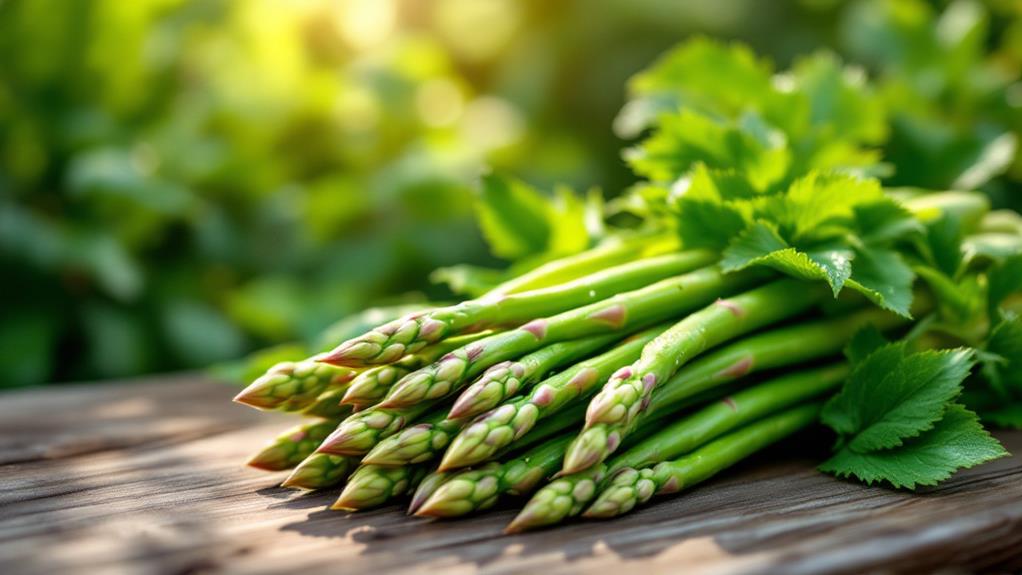What Are Scallions and Why Should We Eat Them? Nutritional Benefits Explained
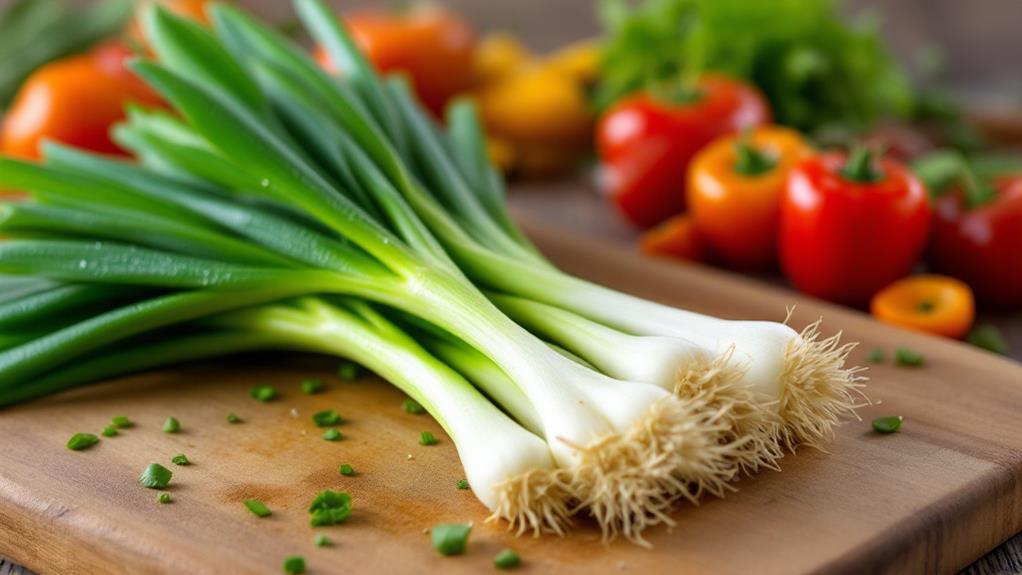
Scallions, also called spring onions, are part of the Allium family and offer more than just a burst of flavor. They're low in calories but packed with vitamins A, C, and K, crucial for immune strength and bone health. With antioxidants like quercetin, they support heart health and lower inflammation risks. The fiber in scallions aids digestion, while minerals like calcium and potassium improve muscle and bone function. Regardless of how you sauté, grill, or use them fresh, scallions add a nutritious punch to your meals. Uncover how these green wonders can brighten up your culinary and health routine.
Understanding Scallions
Regarding understanding scallions, you'll find they're much more than just a garnish. Known as spring onions, these lively greens belong to the Allium family and are scientifically classified as Allium fistulosum. Unlike their bulbous relatives, scallions are prized for their crisp green tops. They're incredibly low in calories, with just 32 calories per 100 grams, which makes them an excellent enhancement to a health-conscious diet.
Packed with fundamental vitamins A, C, and K, scallions provide a nutritional increase to your meals. These vitamins are vital for maintaining your body's general health. Scallions are also rich in antioxidants, including quercetin. These compounds support heart health by potentially lowering cholesterol and blood pressure levels.
The dietary fiber in scallions aids digestion, helping to prevent constipation and supporting gut health. This fiber content not only keeps your digestive system in check but also contributes to a feeling of fullness, aiding in weight management.
With regard to culinary applications, scallions are incredibly adaptable. You can enjoy them raw in salads, cooked in numerous dishes, or as a flavorful garnish across many cuisines, enhancing both taste and nutrition.
Nutritional Profile
Scallions pack an impressive array of nutrients, making them a powerhouse supplement to your diet. With just 32 calories per 100 grams, they're a low-calorie option that doesn't skimp on nutritional benefits. Rich in dietary fiber, scallions offer about 2.6 grams per 100 grams, aiding digestion and promoting gut health. This fiber content can be a significant component in maintaining a balanced diet.
Scallions shine in their vitamin content, being an excellent source of vitamins A, C, and K. With 207 micrograms of vitamin K per 100 grams, scallions play a pivotal role in supporting bone health and enhancing immune function. The presence of important minerals like calcium (72 mg) and potassium (276 mg) further underscores their nutritional profile. These minerals are crucial for maintaining muscle function and bone density.
But that's not all—scallions are also packed with flavonoid antioxidants, particularly quercetin. These antioxidants may help reduce inflammation and support cardiovascular health, making scallions a beneficial supplement to any meal. By integrating scallions into your diet, you're choosing a versatile ingredient that supports comprehensive health and wellness without compromising on flavor or nutrition.
Health Advantages
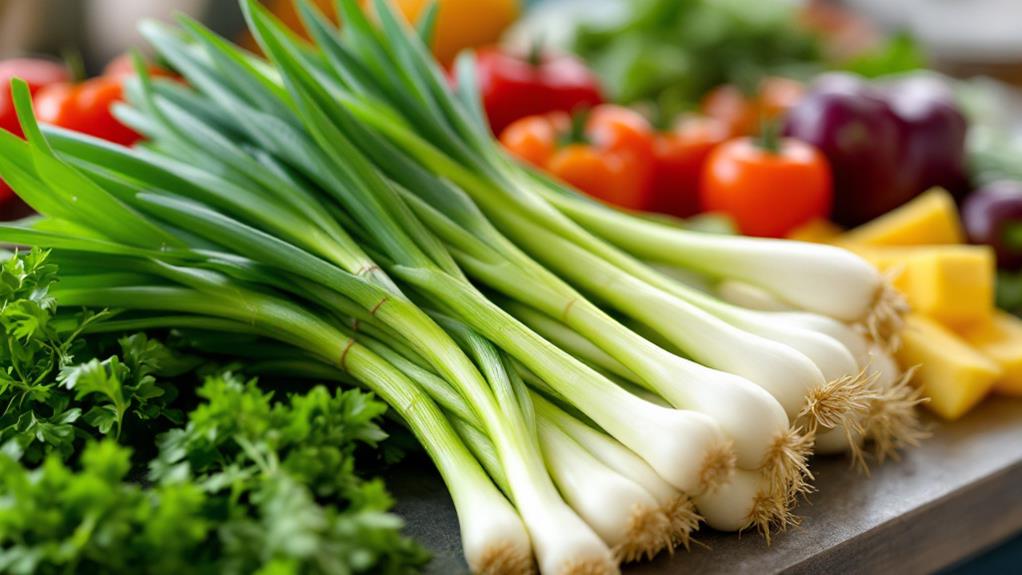
Adding scallions to your meals doesn't just improve flavor; it offers remarkable health advantages too. Rich in vital vitamins like A, C, and K, scallions support your immune system and promote bone health. These nutrients contribute to your comprehensive well-being, making scallions a fantastic supplement to your diet.
Scallions are packed with flavonoid antioxidants, particularly quercetin, known for its potential in lowering blood pressure and reducing heart disease risk. This makes them an excellent choice for maintaining cardiovascular health. Furthermore, the fiber content (2.6 grams per 100 grams) in scallions is a boon for digestive health, aiding in regular bowel movements and ensuring a healthy gut.
Moreover, scallions boast potential anticancer properties due to allicin, which can inhibit the growth of stomach cancer cells. They also offer antimicrobial benefits, effectively combating harmful bacteria like salmonella and E. coli, contributing greatly to food safety.
- Support immune and bone health: High in vitamins A, C, and K.
- Promote cardiovascular health: Contain quercetin and flavonoid antioxidants.
- Improve food safety: Offer antimicrobial benefits against common bacteria.
Incorporating scallions into your meals not only enriches taste but also fortifies your health on multiple fronts.
Culinary Applications
With their mild onion flavor, scallions, also known as green onions, effortlessly elevate a variety of dishes. They're a wonderful supplement to your culinary toolkit, increasing both taste and nutritional benefits. Scallions are low in calories, with about 32 calories per 100g, yet they pack a punch with vitamins A, C, and K. This makes them an excellent choice for those looking to enrich their meals without adding many calories.
You can enjoy scallions in numerous culinary applications, regardless of being raw or cooked. Toss them into salads or use them as a garnish to add a fresh, crisp element. Their versatility shines in dishes like scallion pancakes, where they're cooked to perfection, or when grilled, which brings out a delightful sweet, charred flavor. They pair beautifully with vegetables, proteins, and grains, making them a staple in global cuisines, particularly Asian dishes.
Scallions maintain their nutritional benefits regardless of how you prepare them, making them a smart supplement to both light, fresh dishes and hearty meals. Their ability to elevate flavor without overwhelming other ingredients guarantees they'll quickly become a favorite in your kitchen repertoire.
Storage Tips
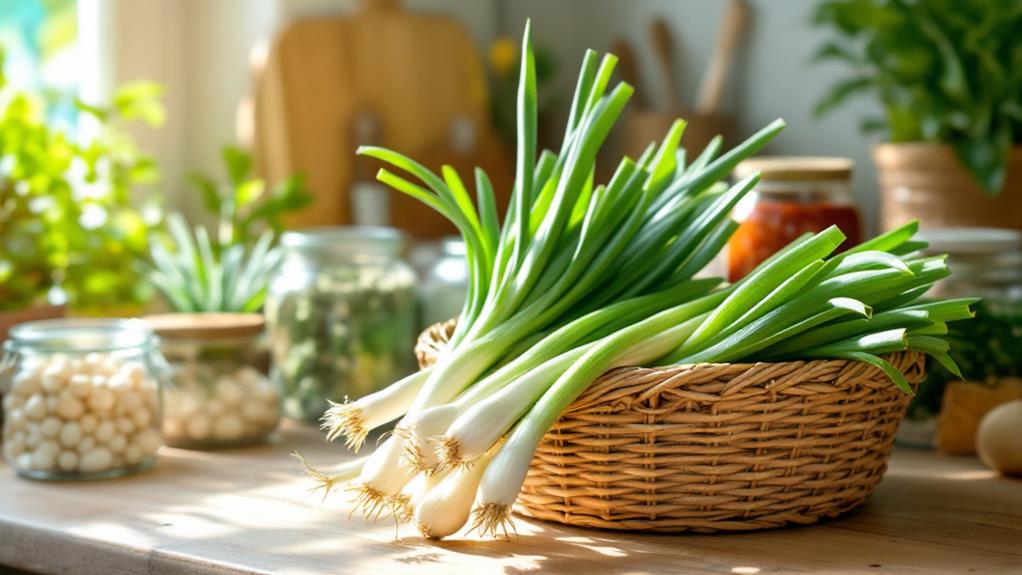
While scallions effortlessly improve your dishes with flavor and nutrition, knowing how to store them properly guarantees they remain fresh and lively. To maintain their freshness for up to a week, store scallions in a perforated plastic bag in the refrigerator. When selecting scallions, always choose firm, brilliant green stalks and avoid any with yellowed or wilted tops for peak flavor. Proper storage not only keeps them fresh but also preserves their nutrients.
Here are some storage tips to help you get the most out of your scallions:
- Trim and Rinse: Before storing, trim the roots and outer layers, rinse them, and pat them dry to prevent spoilage.
- Glass of Water: Store scallions upright in a glass of water in the refrigerator, much like fresh herbs, to keep them fresh longer.
- Freeze for Longevity: Though freezing preserves their flavor and nutrients, try to use frozen scallions within a week of purchase for the best quality.
Potential Side Effects
Scallions, though generally a safe and nutritious choice, can sometimes lead to unexpected side effects if not consumed mindfully. Their high fiber content, while beneficial in moderation, may cause digestive disorders like bloating, nausea, or acid reflux when eaten excessively. You might encounter gastrointestinal discomfort, such as stomach pain and gas, if you have an intolerance and consume them in large quantities.
If you're taking blood-thinning medications, like warfarin, be cautious with scallions due to their vitamin K content. This vitamin can interfere with the effectiveness of your medication. It's wise to seek medical advice if you're unsure about how much you can safely eat.
Allergic reactions to scallions are rare but possible. Symptoms can range from mild, such as skin rashes and swelling, to severe, including anaphylaxis, which might cause breathing difficulties. If you know you have allergies to other Allium species, like garlic and onions, avoiding scallions is prudent to prevent cross-reactivity.
Cooking Techniques
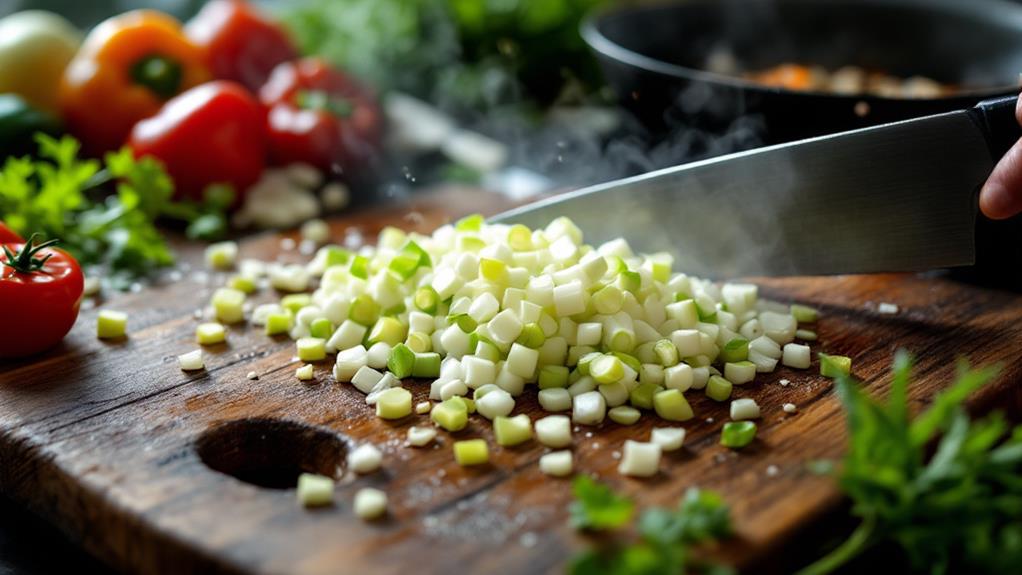
A cook's versatility shines when using scallions, as these flavorful greens adapt well to diverse cooking techniques. You can investigate a range of methods to bring out the unique taste and nutritional benefits of scallions. Sautéing them transforms their flavor, yielding a sweet and aromatic base perfect for stir-fries, soups, and sauces. This quick cooking technique improves dishes while maintaining the scallions' healthful properties.
Grilling scallions raises their taste by caramelizing their natural sugars. This creates a charred, smoky flavor that complements meats and vegetables beautifully. The high heat of the grill draws out a deep, rich taste, making grilled scallions a delightful supplement to any meal.
Alternatively, enjoy scallions raw to experience their fresh, mild onion flavor. Including them in salads, sandwiches, or as a garnish for soups and stews keeps the flavors lively and the nutrients intact. For top-notch flavor and nutrition, remember to chop scallions just before using them.
- Sautéing: Sweetens flavor, great for soups and stir-fries
- Grilling: Adds charred, smoky taste, pairs with meats
- Fresh: Mild flavor, ideal for salads and garnishes

